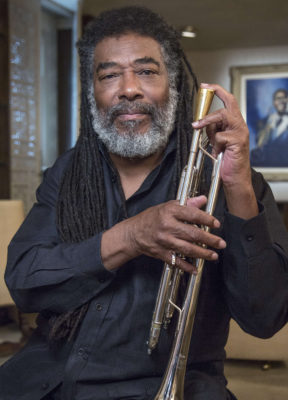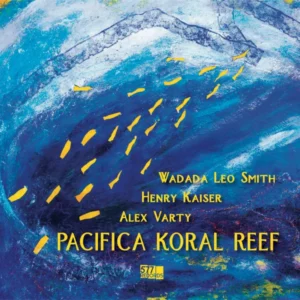Wadada Leo Smith – Pacifica Koral Reef – with Henry Kaiser and Alex Varty

Image by Jimmy Katz
I first heard Wadada Leo Smith in the mid-1980s in New Haven. From the first note, he had my full attention. I remained riveted throughout his performance. I heard not a single “busy” note – a common sin among instrumentalists. Nor was there the tiniest fraction of “filler” or “transition.” He made no attempt to surprise me, yet every note came to my ear fresh.
It was uncontaminated music, and there’s nothing easy about that.
Musicians pay a hefty price to master the craft. All the while, as they learn their way around their instrument, both instructors and peers deluge them in do’s and don’ts, should’s and shouldn’ts.
So much to learn, but so much to unlearn.
How did Wadada Leo Smith find the courage to let go of so much, and the fearless will to develop his own language and terminology to describe a work of art that is “realized in the present moment”?
His use of the word “creation” rather than “improvisation” is apt. Improvisation without creation is empty. It’s that busy filler or transition that always makes me cringe and cast about for the exit.
Time and time again, I have immersed myself in his music, with no disappointment – or even the slightest fear of disappointment. Sometimes you just know who you can trust.
So here I am, almost 40 years after that first listening experience, turning my ear to Wadada Leo Smith again, in a magnificent work called Pacifica Koral Reef (577 Records), released January 7th of this year.
There’s a world weariness in the sound of his trumpet, coming at 10:45 minutes into the work, followed by mournful cries. He’s not just “talking about” the dying coral reefs. He has given himself over, so the coral can speak through him.
But the music doesn’t languish in mourning. One hears Smith’s demand to be heard, augmented by Henry Kaiser’s assertive yet eloquent electric guitar feedback. One also hears Smith’s introspection, parsed by Alex Varty’s thoughtful acoustic journeys within the piece.
Finally, one hears an assertion of “presence” – the deep and complex culture of the reef that has survived so many centuries, and rightly calls out for acknowledgement and respect. How can we live with ourselves, if we allow its destruction?
Pacifica Koral Reef communicates more powerfully than any book or journalistic expose. It reaches in and grasps the heart of the listener. Unlike the pollution attacking the reef as it contaminates the water and drives up temperatures to organism-killing levels, Wadada Leo Smith’s music is—as ever—uncontaminated.

